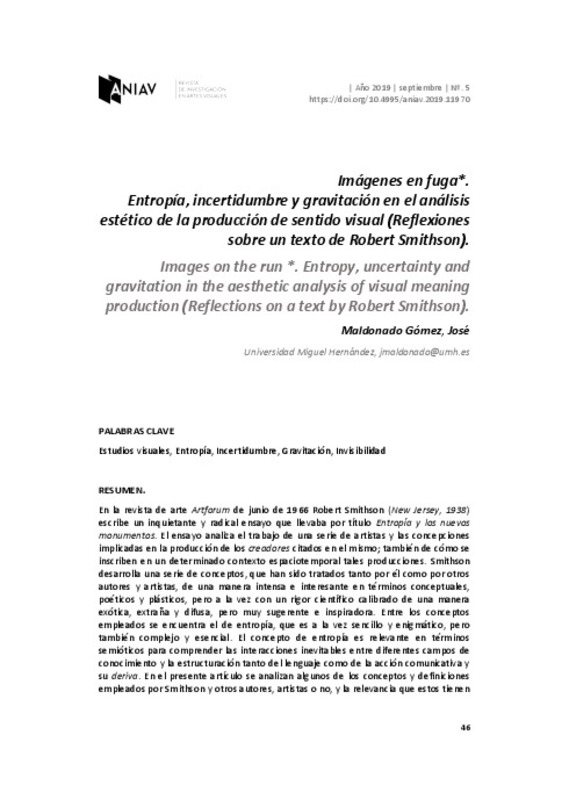|
Resumen:
|
[EN] In Artforum art magazine (June 1966) Robert Smithson (New Jersey, 1938) writes a disturbing and radical essay entitled Entropy and the new monuments. The essay analyzes the work of a series of artists and the conceptions ...[+]
[EN] In Artforum art magazine (June 1966) Robert Smithson (New Jersey, 1938) writes a disturbing and radical essay entitled Entropy and the new monuments. The essay analyzes the work of a series of artists and the conceptions involved in the production of the creators cited therein; also, of how such productions are inscribed in a certain space-time context. Smithson develops a series of concepts, which have been treated by him and by other authors and artists, in an intense and interesting way in conceptual, poetic and plastic terms, but at the same time with a scientific rigor calibrated in an exotic, strange way. and diffuse, but very suggestive and inspiring. Among the concepts used is entropy, which is both simple and enigmatic, but also complex and essential. The concept of entropy is relevant in semiotic terms to understand the inevitable interactions between different fields of knowledge and the structuring of both language and communicative action and its derivation. In this article, we analyze some of the concepts and definitions used by Smithson and other authors, artists or not, and the relevance they have for working with images, the production of meaning through them, and the constant retro-adjustment (retroreading, etc.) that we must apply to avoid, or at least slow down, the disappearance (degree of visibility) or leakage of the images constituted or conformed, independently of their nature. That is to say, an attempt is made to investigate the trend, through the generation and translation of mathematical physical matemas, among other tools, of the alleged images to the fugue both of their potential linguistic and plastic sense, visually (their disappearance, distancing or equilibrium), and the factors that make images and their production, emission and reception, independent and liberated knowledge objects with a high metaphorical potential, and therefore, linked with concepts and dynamics such as entropy, uncertainty and gravitation.
[-]
[ES] En la revista de arte Artforum de junio de 1966 Robert Smithson (New Jersey, 1938) escribe un inquietante y radical ensayo que llevaba por título Entropía y los nuevos monumentos. El ensayo analiza el trabajo de una ...[+]
[ES] En la revista de arte Artforum de junio de 1966 Robert Smithson (New Jersey, 1938) escribe un inquietante y radical ensayo que llevaba por título Entropía y los nuevos monumentos. El ensayo analiza el trabajo de una serie de artistas y las concepciones implicadas en la producción de los creadores citados en el mismo; también de cómo se inscriben en un determinado contexto espaciotemporal tales producciones. Smithson desarrolla una serie de conceptos, que han sido tratados tanto por él como por otros autores y artistas, de una manera intensa e interesante en términos conceptuales, poéticos y plásticos, pero a la vez con un rigor científico calibrado de una manera exótica, extraña y difusa, pero muy sugerente e inspiradora. Entre los conceptos empleados se encuentra el de entropía, que es a la vez sencillo y enigmático, pero también complejo y esencial. El concepto de entropía es relevante en términos semióticos para comprender las interacciones inevitables entre diferentes campos de conocimiento y la estructuración tanto del lenguaje como de la acción comunicativa y su deriva. En el presente artículo se analizan algunos de los conceptos y definiciones empleados por Smithson y otros autores, artistas o no, y la relevancia que estos tienen para el trabajo con imágenes, la producción de sentido a través de estas, y el constante retroajuste (retrolectura, etc…) que debemos aplicar para evitar, o al menos ralentizar, la desaparición (grado de visibilidad) o fuga de las imágenes constituidas o conformadas, independientemente de su naturaleza. Es decir, se intenta investigar la tendencia, a través de la generación y traslación de matemas físico matemáticos, entre otras herramientas, de las pretendidas imágenes a la fuga tanto de su potencial sentido lingüístico como plástica, visualmente (su desaparición, alejamiento o momento de equilibrio), y los factores que hacen de las imágenes y su producción, emisión y recepción, objetos de conocimiento independientes y liberados con un alto potencial metafórico, y por consiguiente, enlazados con conceptos y dinámicas tales como entropía, incertidumbre y gravitación.
[-]
|








